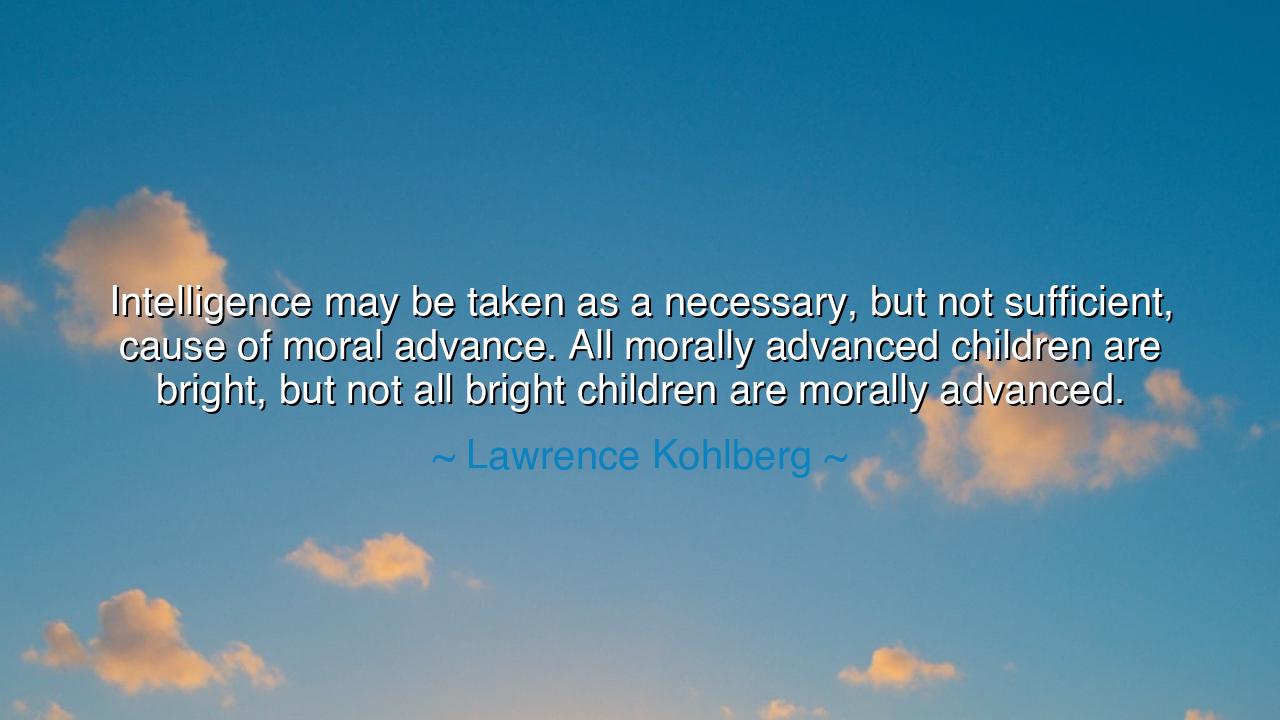
Intelligence may be taken as a necessary, but not sufficient
Intelligence may be taken as a necessary, but not sufficient, cause of moral advance. All morally advanced children are bright, but not all bright children are morally advanced.






“Intelligence may be taken as a necessary, but not sufficient, cause of moral advance. All morally advanced children are bright, but not all bright children are morally advanced.” – Lawrence Kohlberg
In these words, Lawrence Kohlberg, the great moral philosopher and psychologist, offers a truth as old as wisdom itself: that intelligence alone does not make one good. He, who devoted his life to studying the stages of moral development, understood that the light of the mind is not the same as the light of the heart. A sharp intellect can see the world clearly, but only a noble soul can see it justly. Thus, when he says that intelligence is “necessary but not sufficient” for moral growth, he reminds us that reason is but the vessel, and compassion, conscience, and courage are the substance it must hold.
The ancients knew this well. In the halls of Greece, Socrates spoke not only of logic but of virtue, teaching that knowledge without goodness is cunning, and that wisdom begins when thought bends toward justice. The clever man may devise arguments to justify his desires, but the moral man questions his own heart before acting. For the one who learns only to think becomes skilled in deception, while the one who learns also to feel becomes wise in judgment. Kohlberg’s insight, spoken in the language of psychology, echoes this eternal truth: the intellect can guide the mind, but only moral vision can guide the soul.
Consider, for example, the story of Oskar Schindler, a man of both intellect and transformation. He was, by nature, ambitious and shrewd — a man who used wit and charm to gain wealth under the shadow of tyranny. His intelligence opened doors, but it was not until his conscience awakened that his greatness was born. Amid the horrors of the Holocaust, Schindler chose not profit, but principle; not comfort, but courage. He risked his life to save hundreds of Jews from death, guided not by cleverness but by compassion. His story stands as proof of Kohlberg’s message: that moral advancement is not the triumph of intellect, but the flowering of empathy and justice within an intelligent heart.
And yet, how often do we mistake brilliance for virtue? The world is full of bright minds who build empires but destroy trust, who invent marvels but exploit the weak, who command admiration but lack humility. History remembers men of great intelligence who turned their genius toward destruction — tyrants, manipulators, and deceivers whose cunning outpaced their conscience. Their brilliance lit no path for mankind; it only deepened the darkness. Thus, Kohlberg’s warning is a mirror to our times: without moral development, intelligence becomes dangerous, a weapon in the hands of ego rather than a tool in the service of good.
True moral intelligence begins not in the mind but in the heart. It is born of empathy, the ability to feel the suffering of another as one’s own. It matures through reflection, through the struggle between selfishness and duty, and it is refined through the courage to act rightly even when it costs dearly. Kohlberg, through his studies, saw that moral reasoning evolves in stages — from the fear of punishment, to social conformity, to finally acting upon principles of justice and universal care. But this ascent does not come automatically with knowledge. It is a conscious choice, a daily discipline of the soul.
Let this teaching, then, be heard by all who pursue learning: to educate the mind without educating the conscience is to build a sword without a hand to wield it rightly. Intelligence must be wed to empathy, reason joined with righteousness. The wise do not seek only to know what is true, but also to live what is good. Knowledge is power, but goodness is purpose. The mind that knows but does not care is a storm without direction; the heart that feels but does not think is a fire without form. Only when the two unite does man approach the full stature of humanity.
So, take this lesson into your own life: cultivate not only the intellect, but also the conscience. Strive for excellence, but temper it with humility. Use your intelligence not to dominate, but to uplift. When faced with choice, ask not, “What is clever?” but “What is right?” For the truly morally advanced soul is not the one who shines the brightest in knowledge, but the one who walks the farthest in goodness. And when intellect bows to virtue, when reason serves compassion, then — and only then — does the light of human intelligence become worthy of the divine spark from which it came.






AAdministratorAdministrator
Welcome, honored guests. Please leave a comment, we will respond soon